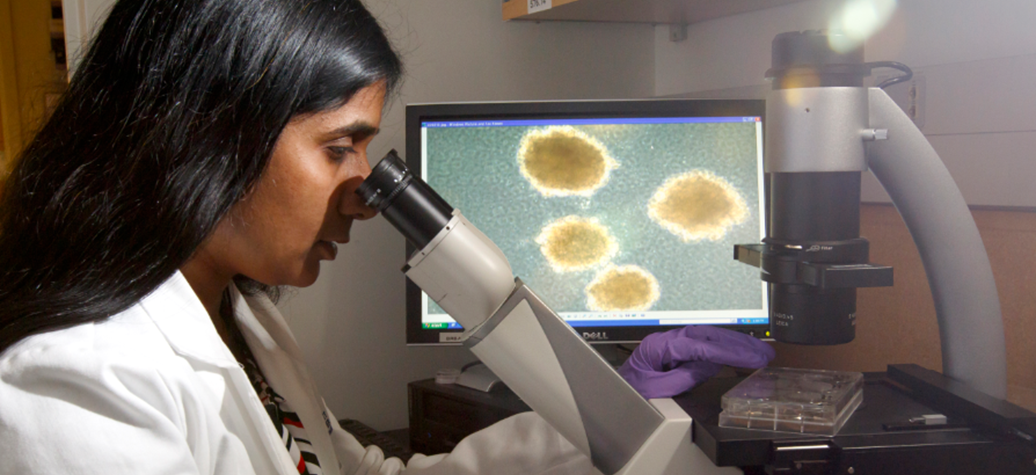Research

The Division of Oncological Sciences aims to better understand cancer through basic, translational and population-based research that improves cancer prevention, detection and treatments for all.
Our community of faculty, trainees and staff brings together scientists from a broad range of disciplines and works collaboratively to advance innovation and translate discoveries from the lab into meaningful impacts for cancer patients and our community.
Based in team science, our research centers on four areas:
The aim of Precision Systems Oncology is to decipher mechanisms of dynamically interacting biological ecosystems and emergent properties, to understanding cell state transitions, immune evasion, therapy-resistance, and early tumor dissemination. A foremost priority is to better understand cell plasticity by gaining the ability to experimentally decipher transitions from normal to cancer, cancer to metastasis and metastasis to resistance.
This section is a biology-based interdisciplinary field focused on complex interactions within biological systems, using a holistic approach to biological research. This section encompasses researchers interested in analytics of the tumor and tumor ecosystem including individuals who are generating diverse quantitative datasets as well as individuals with computational and mathematical expertise to integrate these data to model complex biological systems and, thereby, obtain a deeper understanding of the molecular origins, evolution, treatment vulnerabilities, and treatment adaptations of cancer.
This section includes Precision Early Detection through the Cancer Early Detection Advanced Research (CEDAR) center and Precision Oncology through the SMMART program. Both programs rely on the integration of emerging capabilities in imaging and OMICS technologies, innovative model systems, cohort building and unique clinical trials to generate novel insights, development and translation of discoveries to practice.
Cancer data science describes the interdisciplinary quantitative approaches that draw from machine learning, statistics and computer science to solve biological problems relevant to cancer. The field often grapples with large and unstructured data and strives toward integrating information from many sources. The goal is to develop an understanding of the causes of real world problems such as predicting cancer vulnerabilities, understanding the etiologic causes of cancer, and predicting cellular behaviors. The newly formed Center for Biomedical Data Sciences (jointly with University of Oregon) serves as a nexxus for advancing research in this area. This section includes researchers interested in solving cancer problems using computational, informatic and statistical tools and approaches.
The primary objective of the Chemical Biology and Experimental Therapeutics (CBET) is to translate the basic research into drug discovery and development projects. CBET brings together innovative tools and approaches derived from chemistry to provide an unprecedented view of previously unseen processes in living systems. This section includes translational research through the Center for Experimental Therapeutics (CET), which spans the entire spectrum of novel therapeutic screening, preclinical model development and testing, and translation to clinical trials. This section has a diverse group of researchers interested in employing the tools of synthetic chemistry, molecular modeling, imaging and chemical biology to understand disease biology, and for translational research in drug discovery, development, imaging and radiation.
The Cancer Population Science program in the Division of Oncological Sciences at the OHSU Knight Cancer Institute studies why people get cancer and how things like environment, lifestyle, genes, and social factors influence their risk and outcomes. Our goal is to use this knowledge to develop and test ways to prevent cancer and improve outcomes for everyone.
Robust technology and resources for cancer researchers
The Division of Oncological Sciences has access to state-of-the-art technology, resources and expertise to help our investigators reach their scientific goals, including:
- Advanced Multiscale Microscopy
- BioLibrary and Pathology
- Biostatistics
- Flow Cytometry
- Integrated Genomics
- Proteomics
Featured news
OHSU Knight Cancer Institute helps address cancer-related needs across Oregon
NCI funds four major cancer survivorship projects at OHSU
Six OHSU researchers among world’s most highly cited
More than 40,000 people have enrolled in the Healthy Oregon Project
Tobacco use assessments dropped during COVID-19 pandemic, have not recovered
Study confirms the unique danger of postpartum breast cancers